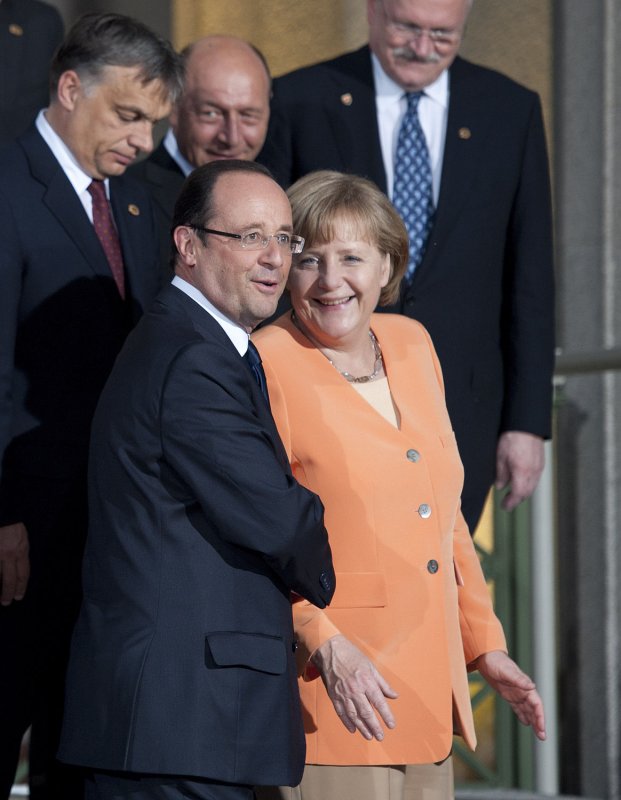French President Francois Hollande (L) is shown with German Chancellor Angela Merkel at a NATO meeting in 2012. The two have severe differences in leading their countries' economies. UPI/Brian Kersey |
License Photo
ZURICH, Switzerland, May 6 (UPI) -- Under the strain of the euro crisis, trans-national politics in Europe are becoming unpleasantly personal, particularly between Paris and Berlin, which is putting a growing strain on a fragile system.
The latest fuss hinges on growing tensions between German Chancellor Angela Merkel and French President Francois Hollande.
A year ago, Merkel was campaigning almost openly for the re-election of her fellow-conservative, the incumbent President Nicolas Sarkozy. When the Socialist candidate Hollande defeated Sarkozy, he and Merkel tried to smooth over the tension but soon found themselves at loggerheads over the most important aspect of European policy.
Merkel wanted to continue with financial austerity and budget cuts. Hollande tried to put together a rival coalition of Spain and Italy to oppose austerity and delay the budget cuts and focus instead on growth and job creation.
Now as Merkel faces her own re-election in the fall, Hollande -- or at least members of his staff and his government -- are making no secret of their hope that she will be defeated and replaced by a more congenial German government, a coalition of Social Democrats and Greens.
This isn't the first time that European politics have grown personal. British Prime Minister David Cameron laid out the red carpet for Sarkozy when he was campaigning for re-election and snubbed Hollande when he visited London. And Merkel campaigned openly for Italian Prime Minister Silvio Belusconi to be dismissed and replaced by a centrist technocrat Mario Monti.
Berlusconi got his revenge, forcing the resignation of Monti, and he is now the power behind the throne in the new Italian coalition of his own party and the center-left.
But the rift between Paris and Berlin, as the two dominant economies of the eurozone, is more serious. Few decisions can be made in Europe unless the French and Germans are in accord. And now they are openly hostile.
At a briefing of German ambassadors to other European countries in the library of the Berlin Foreign Ministry last month, Merkel's top adviser of European policy, Nikolaus Meyer-Landrut, warned that he expected nothing to be achieved before German elections in September. The reason, he made clear, was that France was waiting in hope of a new German government. Even a grand coalition of Merkel's conservatives and the Social Democrats, Paris believes, would soften Merkel's hard line.
Then two internal documents were leaked in Berlin. One came from Merkel's existing partners in the government, the Free Democrats, who said the French president was "meandering" in his policies and that France was suffering from its "highly regulated labor market and highly developed social security system."
At the same time, an internal study of French economic weakness was leaked from the German ministry of economics, saying: "French industry is increasingly losing its competitiveness. The relocation of companies abroad continues. Profitability is meager."
It went to say that French wages were too high and the French didn't work hard enough, having "second lowest annual working time" in Europe, "The tax and social security burden" is the highest of any country using the euro currency and France had fallen far behind in its investments in research and development.
This followed the leak to Le Monde newspaper in Paris of a draft Socialist Party position paper, which said there would have to be "a showdown" with Germany's "chancellor of austerity." Merkel herself was slammed for "selfish intransigence," and that she was concerned only with "the savings of depositors in Germany, the trade balance recorded in Berlin and her electoral future."
In a separate story, Le Monde quoted one senior, but anonymous, French Socialist saying: "To do politics, you need an enemy, and if that enemy is Germany, that doesn't bother me."
The real problem is that France is no longer strong enough to balance Germany within the eurozone, and its situation is getting worse.
France's budget deficit was more than 4 percent of gross domestic product last year. Germany's budget deficit was nil.
French unemployment is nudging 11 percent; Germany's level is half that, at 5.4 percent.
Among young people, 26 percent are out of work in France and 8 percent in Germany.
Germany recorded a trade surplus of 6 percent of GDP last year and France reported a trade deficit of 2 percent.
The French government consumes 56 percent of France's GDP; the German government takes 46 percent.
This situation may not last. Germany's birthrate, of an average 1.4 children per woman for the past 30 years, spells a dismal future of declining workforce and ever more elderly pensioners. France, by contrast, has a growing population, with 2.2 children per woman.
If France can find ways to put its people to work, it should have a healthy growth economic growth rate in the future. But given the degree to which today's Europe depends on the strength and vigor of the German economy, it is sobering to realize that Europe is running out of Germans.
But in the meantime, of Europe is to haul itself out of crisis, France and Germany need to work together and resolve this personal spat between two leaders who have yet to understand how deeply their two countries depend upon one another, now and in the future of transformed demographic prospects.















